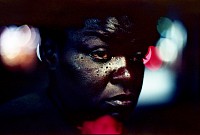BIOGRAPHY

b. 1985
It is easy to walk through a city not making eye contact, but for Khalik Allah this contact is essential. He sees each individual he photographs. And his photographs in turn allow us to see them, to acknowledge who we might ignore, to look through Allah’s eye and into theirs, and to recognize them as individuals. This is the power of Allah’s work: to give us a deeper sense of people as people, to share and enlighten, even when the message may not be easy.
This work as well and those from his book, Souls Against the Concrete (University of Texas Press, 2017), were made at night on 125th Street and Lexington Avenue in Harlem. They provide a glimpse into a world and people that many choose to ignore. His subjects are often drug addicts, homeless, or both as with Frenchie, a Haitian immigrant who Khalik befriended. Using only the available light from shop windows, street lights, or subway platforms, he photographs with a slow color film, a combination that produces images full of grain and texture, a visual shorthand for the roughness and intensity of life on the street, and his own struggles early in life. The light is also often harsh or even surreal, resulting in figures awash in blues and reds. Luc Sante, in The New York Times Book Review, wrote, "The result is a panorama of human emotion: sadness, passion, bewilderment, pride, suspicion, amusement, exhaustion — all the faces of the night."
Khalik Allah is also a filmmaker whose work has been championed at numerous film festivals. His 2015 film, Field Niggas (inspired by Malcolm X's 1963 speech, "Message to the Grassroots”) received high acclaim and numerous awards as did his 2018 film Black Mother and his most recent IWOW: I Walk On Water. He also served as one of the cinematographers for Beyoncé's Lemonade and directed videos for members of the Wu-Tang family.
